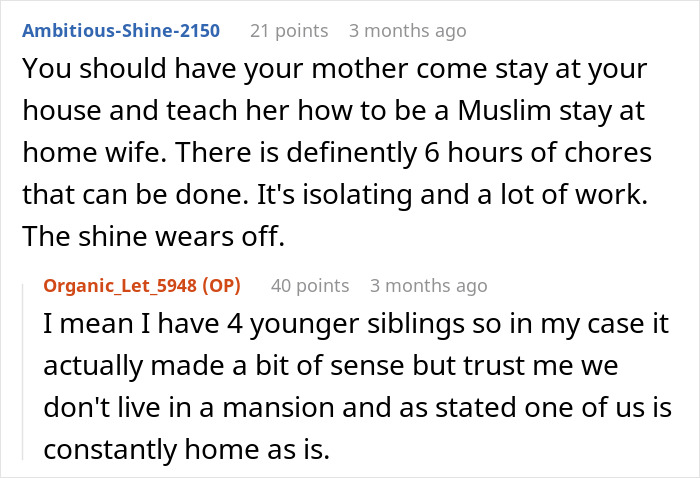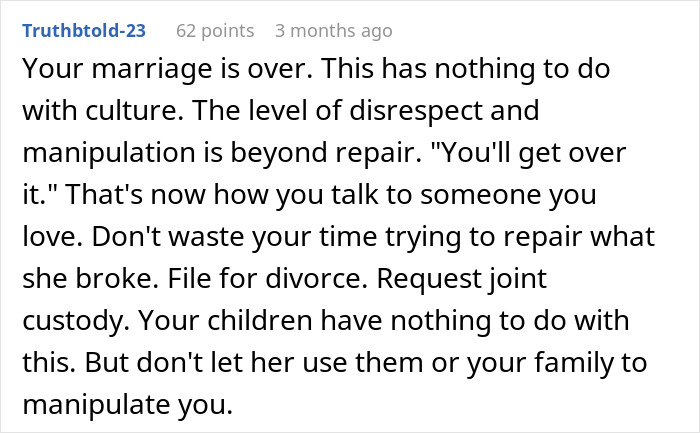For many of us, selecting a life partner may be an exciting yet uncertain process. You’re not just looking for someone who shares your values and interests; you’re also looking for someone who you can go through the highs and lows of life with. So when you find that person, life feels happy and complete.
Over time, perspectives can shift, leading to situations where you may not always see eye to eye with your partner on every decision. For instance, a man turned to the internet for advice after his wife decided to quit her job to become a stay-at-home mother. Keep reading to see how the author’s wife used good food and other tactics to gain his support before secretly quitting her job. Below, you will find our interview with Adv. Isha Pincha, where she discusses the legal process of separation.
You might not always agree with your partner, but it’s important to reach an understanding

Image credits: Ketut Subiyanto / pexels (not the actual photo)
A man shared that he was contemplating divorce after his wife secretly quit her job to become a “tradwife”






Image credits: Ketut Subiyanto / pexels (not the actual photo)




Image source: Organic_Let_5948
Marriage thrives on effective communication between couples
Marriage is a lifelong commitment that creates a personal and legal connection between two people. As a couple, individuals need to align their priorities to make well-rounded decisions about their future. For instance, before making any life-altering decisions, you should have a heart-to-heart conversation with your partner.
However, it’s possible that your better half might not agree with your choices, and you end up fighting. When such arguments become irreconcilable, relationships break down and, in the worst situations, end in divorce. But calling it quits on a marriage is not a small thing.
To understand the intricacies of divorce proceedings, Bored Panda spoke with Adv. Isha Pincha, a family and matrimonial advocate. She graciously offered to share her expertise with us.
It’s a common misconception that you can simply split up with your spouse by signing a piece of paper, but this is untrue. Isha, who practices law in India, believes that people from rural areas often don’t know much about legal proceedings. She says, “We meet many clients who say they have stamp paper duly signed by husband and wife; they believe it’s a divorce paper. This is not their fault, of course. We don’t expect a layman to understand the law and procedure.”
Marriage dissolution processes vary significantly across the globe. They are influenced by distinct legal frameworks and cultural practices. Isha further highlights the persistent stigma surrounding divorce: “Divorce is often viewed as a personal failure, and in many countries, it continues to carry a stigma or be seen as abnormal. However, it’s a common life transition, akin to moving or changing jobs, and it should be accepted as a natural part of life’s journey.”
Couples often benefit from a mandated cooling-off period before finalizing a divorce
She believes that, contrary to the popular belief that children are always devastated by divorce, they might thrive with co-parenting and support. Talking about the actual process, she mentions that after filing for divorce, couples usually have to undergo a mandated cooling-off period. The purpose of this period is to help reduce impulsive decisions and encourage thoughtful consideration of the emotional and practical implications of divorce.
“When we try to do counseling for both spouses, it is sometimes a failure. There are people who don’t understand the happiness of letting go of egos and giving their marriage a new try.”
After self-reflection, a couple might reconcile due to various factors
Isha even spoke about the reasons why couples get back together after nasty fights. “The factors that contribute to reconciliation in relationships include realizing the value of the partnership, engaging in effective communication, taking time for self-reflection on personal contributions to problems, and considering external factors such as financial stress or health issues.”
Couples going through a separation, however, frequently feel a wide range of contradictory feelings. They may be confident in their choice to split up, but they may also be experiencing conflicting emotions of doubt, melancholy, and uncertainty. It can be especially difficult to manage the process of separation and its aftermath because of this emotional ambivalence.
“To handle mixed feelings during the cooling-off period, one should take time to explore their feelings and options. Remember, every situation is unique, and there’s no one-size-fits-all approach to divorce or reconciliation. Prioritize your well-being and seek support.”
In this particular case, the author didn’t agree with his wife’s choice to transition from a working professional to a stay-at-home parent. After threatening her with a divorce, the husband couldn’t imagine his life without his wife. This shows the importance of couples taking time to cool off after conflicts. The space allows them to reflect and make thoughtful decisions. What are your thoughts on this situation? Tell us in the comments below.
Many people felt the author’s wife was being manipulative, while a few thought they simply weren’t a compatible couple






























